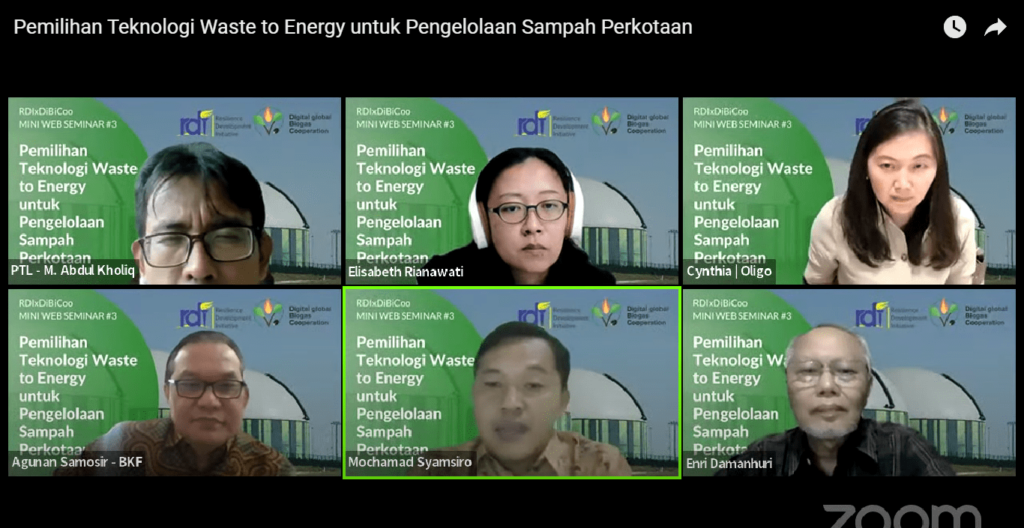Waste management that has been implemented by almost all local governments only transports waste from households, collects it to temporary shelters (TPS) and disposes it into final disposal sites, resulting in waste piling up and causing complex problems now and in the future. Currently, land for landfill is increasingly limited due to rapid urbanisation and economic activity in urban areas. Existing regulations have also limited the disposal of biodegradable waste in landfills. Therefore, proper waste management and recycling is still a challenge in Indonesia. Observing all those points, the Resilience Development Initiative (RDI) held the third RDI x Digital Biogas Cooperation (DiBiCoo) mini web seminar on 12th of January 2022 to bring biogas and gasification technology closer as a solution to all stakeholders in waste management in Indonesia.

Mr. Edi Wibowo, The Director of Directorate of Bioenergy, Ministry of Energy and Mineral Resources was giving a welcoming remark on the mini webinar.
In this mini webinar, the application of biogas and gasification technology were explained technically and socio-economically through real practice. It was also an honour to be attended by the new director of Directorate of Bioenergy, Ministry of Energy and Mineral Sources, Mr. Edi Wibowo, to open this webinar and provide updates on the acceleration of biogas development based on municipal solid waste. Before moving on to more technical material, Cynthia Hendrayani, president director of Oligo Infra, started the webinar by giving an overview of waste management strategy, difficulty, and challenges for each technology. The sharing session was continued by Mochamad Syamsiro, who has a strong background in waste-to-energy technology especially gasification, which brought his experience of implementing gasification in Surakarta. To complement these basic and technical theories, Agunan Samosir, researcher from the Fiscal Policy Agency, Ministry of Finance, brought up the role of government and financing policies that could support waste management efforts at the local level through a waste-to-energy approach. The discussion became more insightful when moving on to Prof. Enri Damanhuri, the father of waste management in Indonesia, who invited the participants to change the paradigm of waste as a problem, yet something that should be arranged for a better life. Another discussant from the Indonesian Biogas Association, M Abdul Kholiq, pointed out the importance of sorting infrastructure and selecting the right technology with holistic considerations.
There are many lessons learned that could be taken from the journey of implementing waste management, including waste-to-energy. This mini webinar concluded that the commitment of the regional head is very important in the selection of waste processing technology and the choice must be consistent. The revision of Law 18 2008 (UU nomor 18 Tahun 2008) on Waste Management was well received and is expected to clarify future strategies, especially in dealing with financing challenges.
Watch our mini webinar here: Pemilihan Teknologi Waste to Energy untuk Pengelolaan Sampah Perkotaan – YouTube
